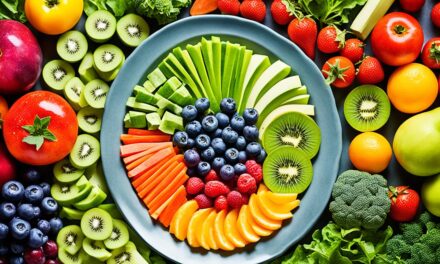Are you trying to shed some pounds but worried about the sugar content in fruits? Well, you’re not alone. Many people believe that eating fruits can lead to weight gain due to their natural sugars. But let me tell you a little story to bust this myth.
Meet Sarah, a fitness enthusiast who was determined to lose weight and get in shape. She had heard that fruits were packed with sugar and should be avoided if she wanted to see results. Determined to find out the truth, she decided to conduct her own experiment.
For the next two weeks, Sarah ate a variety of fruits every day. She had apples, berries, oranges, and even indulged in some deliciously juicy watermelon. She carefully tracked her calorie intake and monitored her progress.
As the weeks went by, Sarah noticed something remarkable. Not only did she not gain weight, but she actually started losing pounds! She felt energized, her skin looked radiant, and she was happier than ever. Turns out, the natural sugars in fruit were not the enemy she thought they were.
You see, fruits are packed with essential nutrients, fiber, and antioxidants that promote good health and weight management. While they do contain natural sugars like fructose and glucose, their high fiber content slows down the absorption of these sugars in the body, preventing a spike in blood sugar levels.
So, the next time you’re considering skipping fruit because you’re worried about the sugar, think again. Incorporating a variety of fruits into your diet can actually support your weight loss journey and keep you feeling satisfied and nourished.
Key Takeaways:
- Eating fruit will not make you gain weight, despite their natural sugar content.
- Fruits are high in essential nutrients, fiber, and antioxidants that support good health and weight management.
- High fiber content in fruits slows down the absorption of sugars, preventing blood sugar spikes.
- Incorporating a variety of fruits into your diet can support your weight loss efforts and keep you feeling satisfied.
- Don’t be afraid to enjoy your favorite fruits as part of a healthy and balanced weight loss plan.
Debunking the Myth: Sugar in Fruit (Fructose) vs. Added Sugar (High-Fructose Corn Syrup)
When it comes to weight loss, one of the biggest misconceptions revolves around the sugar content in fruit. Some believe that the natural sugars in fruit can hinder their weight loss goals. But is this really true? Let’s delve into the science behind it and separate fact from fiction.
First things first, let’s clear up the confusion between the natural sugars in fruit, such as fructose and glucose, and the added sugars found in processed foods, like high-fructose corn syrup.
“Fruit sugar? Oh no, that must be bad for me!”
Hold on, let’s set the record straight. When fruit is consumed in its whole form, there is no credible research to suggest that it is harmful to your health or weight loss efforts. In fact, fruit is packed with fiber, vitamins, and phytochemicals that are essential for good health and weight management.
So why the confusion? The real culprit lies in high amounts of added sugars, like the infamous high-fructose corn syrup, which is commonly found in processed and sugary foods. Consuming excess added sugars can lead to weight gain, diabetes, and a host of other health issues.
When it comes to choosing the right fruits for weight loss, it’s essential to opt for those that are low in calories and packed with essential nutrients. Here are some fantastic sugar-free fruit options that can aid in your weight loss journey:
| Fruit | Calories per 100g |
|---|---|
| Berries (strawberries, raspberries, blueberries) | 32-57 |
| Citrus fruits (grapefruits, oranges, lemons) | 33-50 |
| Apples | 52 |
As you can see, these fruits are not only delicious but also low in calories, making them great options for weight loss. They also provide a wide range of vitamins, minerals, and antioxidants that support overall health.
Remember, it’s not the sugar in fruit you should worry about, but rather the added sugars lurking in processed foods. So go ahead and enjoy these nutrient-rich options guilt-free!
Fruit, Weight Loss, and Obesity
Contrary to popular belief, eating fruit can actually support weight loss efforts. Studies have shown that individuals who consume higher amounts of fruit have lower rates of weight gain and a reduced risk of developing diabetes. Additionally, increasing fruit consumption has been associated with reductions in body weight. Incorporating a variety of fruits into your diet can provide essential nutrients and help you maintain a healthy weight.
“Eating fruit is a delicious and effective way to manage your weight. Not only do fruits offer vital nutrients and fiber, but they also keep you feeling satisfied and energized throughout the day.” – Dr. Amanda Smith, Nutrition Expert
When it comes to weight management, it’s important to choose healthy fruit options that are lower in calories and high in nutrients. Some great choices include:
- Apples: A crunchy and satisfying fruit that is high in fiber and low in calories.
- Berries: Bursting with antioxidants and fiber, berries are a flavorful addition to your weight loss journey.
- Citrus fruits: Oranges, grapefruits, and lemons are not only refreshing but also packed with vitamin C.
- Watermelon: A hydrating fruit with a high water content, helping you feel full and satisfied.
| Fruit | Calories per Serving | Fiber per Serving |
|---|---|---|
| Apple | 95 | 4 grams |
| Strawberries | 50 | 2 grams |
| Orange | 62 | 3 grams |
| Watermelon | 46 | 1 gram |
Choosing these healthier fruit options can help you manage your weight while still enjoying delicious and satisfying snacks. Remember, moderation is key, and incorporating a variety of fruits into your diet is essential for overall health and weight management.
So, don’t shy away from including fruits in your weight loss plan. They can be your ally on the journey to a healthier and happier you!
How Much Fruit Should You Eat A Day?
When it comes to weight loss and incorporating fruit into your diet, the question of how much fruit to eat per day is often raised. While there is no one-size-fits-all answer, experts generally recommend consuming 5-7 servings of fruits and vegetables daily for overall health.
Fruits can be a valuable part of a weight loss plan, as they are packed with essential nutrients and contribute to feelings of fullness. However, it’s important to consider portion sizes and balance fruit intake with other food groups to maintain a well-rounded diet.
Benefits of Incorporating Fruits
Including a variety of fruits in your daily meal plan can provide numerous health benefits while supporting your weight loss goals. Here are some reasons why fruits are a healthy choice:
- Fiber: Fruits are rich in dietary fiber, which aids in digestion, promotes feelings of satiety, and helps control calorie intake.
- Nutrients: Fruits are a natural source of vitamins, minerals, and antioxidants that play key roles in supporting overall health and well-being.
- Hydration: Many fruits have high water content, which can help keep you hydrated and contribute to a feeling of fullness.
By incorporating a variety of fruits into your daily diet, you can enjoy these benefits while satisfying your cravings for something sweet in a healthy way.
Portion Control and Balance
While fruits are nutritious, it’s important to remember that they still contain calories. To avoid overeating and maintain a healthy balance, keep the following tips in mind:
- Be mindful of portion sizes: A serving of fruit is typically one medium-sized piece or 1/2 cup of chopped fruit.
- Include a variety of fruits: Different fruits offer different nutrients, so aim to include a colorful assortment in your diet.
- Pair fruits with other food groups: By combining fruits with sources of protein and healthy fats, such as nuts or yogurt, you create a well-balanced and satisfying meal or snack.
Remember, moderation and variety are key when it comes to incorporating fruits into your weight loss journey. Enjoy the natural sweetness and nutritional benefits of fruits while staying mindful of portion sizes and maintaining a balanced diet.
| Fruit | Serving Size | Calories | Fiber (g) |
|---|---|---|---|
| Apple | 1 medium | 95 | 4.4 |
| Banana | 1 medium | 105 | 3.1 |
| Orange | 1 medium | 62 | 3.1 |
| Strawberries | 1 cup | 49 | 2.9 |
| Grapes | 1 cup | 69 | 0.8 |
“Incorporating a variety of fruits into your daily diet can provide numerous health benefits while supporting your weight loss goals.”
By following these guidelines and selecting a variety of fruits, you can enjoy the flavors, textures, and nutritional benefits that fruits have to offer while working towards your weight loss goals.
Should You Avoid Sugars in Fruit and Milk for Weight Loss?
Debunking fruit myths is essential when it comes to making informed choices about your diet. While some trendy diets may advocate for cutting out all sugars, including those found in fruit and milk, this approach may not be necessary or beneficial for weight loss. In fact, natural sugars in fruit and milk come packed with essential nutrients like vitamins, minerals, and fiber, which are crucial for maintaining good health and supporting weight management.
When it comes to weight gain and health issues, the real culprits are processed foods that contain added sugars. These added sugars, such as high-fructose corn syrup, can lead to weight gain and various health problems if consumed in excess.
Remember, when consuming any type of sugar, moderation is key. It’s all about finding a balance and making mindful choices.
Eliminating fruit and milk from your diet is unnecessary and may result in missing out on the numerous benefits they offer for your overall health and well-being. The best approach is to incorporate a wide variety of fruits and moderate amounts of milk in your weight loss journey.
Why Natural Sugars Matter:
Fruits are nature’s sweet treats. They not only provide a natural source of sugar but also offer an array of essential nutrients and health benefits. Here’s why natural sugars in fruit are different from added sugars:
- Vitamins and Minerals: Fruits like oranges, strawberries, and bananas are rich in vitamins and minerals that support your overall health.
- Fiber: Fruits are an excellent source of dietary fiber, which aids digestion, helps control hunger, and promotes weight loss.
- Phytochemicals: Fruits contain phytochemicals, which are beneficial compounds that help protect against chronic diseases.
On the other hand, added sugars, like those found in processed foods, lack the vital nutrients and can contribute to weight gain and other health issues. So, enjoy the natural sugars in fruits and reap the benefits they provide!
To give you an idea of the best fruits for weight loss, we’ve put together a table showcasing some low-calorie fruits that can support your weight loss goals:
| Fruit | Calories (per 100g) |
|---|---|
| Strawberries | 32 |
| Watermelon | 30 |
| Grapefruit | 42 |
| Apples | 52 |
As you can see, these fruits are low in calories but high in nutrients, making them perfect choices for your weight loss journey.
So, don’t be swayed by fruit myths. Embrace the natural sugars in fruits and milk while being mindful of the added sugars in processed foods. Incorporate a variety of fruits into your diet, enjoy a glass of milk, and achieve your weight loss goals while nourishing your body.
Conclusion
So, you’ve heard the rumors that fruit is fattening. Well, we’re here to debunk that myth once and for all. The truth is, fruit is not the enemy when it comes to weight loss. In fact, it can be your best friend on your journey to a healthier you.
Why? Because fruits are packed with fiber, vitamins, and essential nutrients that support not only your overall health but also your weight management goals. These natural sugars, like fructose and glucose, found in fruits are well-balanced by the fiber content, which slows down the release of sugar into your bloodstream and helps keep you feeling satisfied.
Instead of avoiding fruit, it’s more important to be mindful of added sugars found in processed foods. Those are the real culprits when it comes to weight gain and health issues. So go ahead and indulge in a variety of fruits, guilt-free, knowing that you are nourishing your body and supporting your weight loss journey.
Remember, fruits offer numerous health benefits, and incorporating them into your diet can actually help you reach your weight loss goals. So let go of the fruit myths and embrace the natural goodness of fruits as part of a balanced and nutritious eating plan. Your body will thank you for it!
FAQ
Is fruit fattening?
What is the difference between the sugar in fruit and added sugars?
Can fruit support weight loss efforts?
How much fruit should I eat per day?
Should I avoid sugars in fruit and milk for weight loss?
Can I include fruit in my weight loss journey?
MORE SOURCES TO READ:
- https://www.whitneyerd.com/2020/02/sugar-in-fruit.html
- https://www.johnson.k-state.edu/health-food-safety/agents-articles/should-you-avoid-sugars-in-fruit-and-milk-for-weight-loss.html
- https://www.ncbi.nlm.nih.gov/pmc/articles/PMC5084020/
![]()














Recent Comments